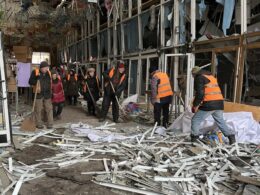The devastation inflicted by Russia's war on Ukraine has extended far beyond cities and infrastructure - it has also severely damaged the country's scientific capabilities and institutions. According to a new report from the United Nations' cultural agency UNESCO, rebuilding Ukraine's scientific facilities and replacing vital equipment will require over $1 billion in funding.
According to ABC News, the report paints a grim picture of the toll taken on Ukraine's research sector, which was internationally renowned in fields like computer science, nuclear physics, and astronomy before the invasion. UNESCO found that 1,443 buildings at 177 different scientific institutions across Ukraine have been damaged or destroyed by Russian attacks over the past two years of war.
The costs to repair or rebuild these ravaged facilities is staggering - an estimated $1.21 billion, with universities absorbing the brunt at nearly $1 billion needed for their scientific infrastructure alone. Another $45.9 million would be required just to replace essential research equipment that has been damaged, stolen, or destroyed.
"We must protect and support (scientific) research in Ukraine," said UNESCO Director-General Audrey Azoulay. "Scientists, engineers and other experts will be essential to the country's recovery."
Beyond the physical destruction, Russia's war has also decimated Ukraine's scientific workforce and intellectual capital. An estimated 10,429 scientists working in public research have been displaced within Ukraine or forced into exile abroad. Of the 5,542 Ukrainian scientists who have fled the country, most to Germany and Poland.
The situation surrounding the Institute for Safety Problems of Nuclear Power Plants near the Russian-occupied Zaporizhzhia Nuclear Power Plant is particularly concerning. Essential equipment used to monitor the plant has been stolen or wrecked, posing serious potential nuclear safety risks to the region and beyond, according to the report.
For a country that contributed considerably to international scientific progress, the losses are staggering. Prior to the invasion, Ukraine employed 88,629 scientists across its research institutions and universities. Rebuilding that intellectual infrastructure and restoring Ukraine's scientific capabilities will be crucial but extremely challenging in the wake of such widespread damage.
Last month, UNESCO reported that Ukraine's cultural sites and tourism industry have sustained nearly $19 billion in losses from the war so far. Between the decimation of its science sector, plundering of its cultural heritage, and broader economic devastation, the costs of Russia's unprovoked invasion continue to mount astronomically.
Reconstructing Ukraine's shattered scientific capacity will require extensive international funding and support in the years ahead. The new $1 billion+ price tag estimated by the UN is a sobering reminder of just how much Putin's war has set back Ukraine's intellectual progress and development.
As Audrey Azoulay stated, Ukraine's scientists and researchers "will be essential to the country's recovery" once hostilities end. But that recovery will require massive investments to overcome the staggering losses inflicted by Russia's senseless destruction of Ukraine's scientific institutions and intellectual capital.
In response to the challenges posed by the war, Ukraine is seeking to expand its battlefield technology through the integration of artificial intelligence (AI). The country's military strategy is shifting towards leveraging technological advantages to counter Russia's larger forces. AI is being incorporated into various aspects of Ukraine's defense, from intelligence processing to the development of autonomous weapons.
The Brave1 defense cluster, for example, aims to stimulate the development of defense technologies, focusing mainly on Mission-Support AI and Operational AI. AI's role in data-intensive warfare scenarios is increasingly acknowledged, with systems like Griselda being used for intelligence gathering and processing. The Saker Scout Unmanned Aerial Vehicle (UAV) system is another example of AI-driven defense technology, equipped with an advanced AI system that allows it to recognize and attack targets in areas where other drones are rendered ineffective due to electronic warfare countermeasures by Russian forces.





